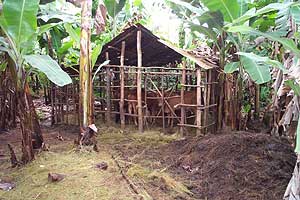Wageningen University, The
Netherlands
November 9, 2004
Plantains, otherwise known as
cooking bananas, are an important food crop in Tanzania and
require fertile soil for a good harvest. For around four
centuries now, banana-growing land has been enriched by
supplements of manure from cattle grazing on nearby pastures.
The strongly increasing population pressure in recent decades
has led to a decrease in pastureland and, consequently, manure,
causing a reduction in banana harvests. Green manure crops such
as herbaceous legumes provide a solution embraced by local
farmers, writes Frederick P. Baijukya in his doctorate thesis
Adapting to change in banana-based farming systems of northwest
Tanzania, which he will be defending on Monday 8 October at
Wageningen University.
In his research, Baijukya examined agronomical and
socio-economic aspects of the integration of leguminous plants
into the agricultural system and reached some encouraging
conclusions. His study began with making an inventory of changes
in land use via geographical information systems, interviews
with local growers and historical documentation. In addition,
field tests involving various legume varieties were carried out
together with farmers to determine which species were the most
suitable.
 Local
farmers had various reasons for legume cultivation, including
weed suppression, increasing harvests and improving the
availability of cattle feed. Models were computer-designed,
allowing Baijukya to propose optimal solutions tailor-made to
the objectives of individual farmers. Local
farmers had various reasons for legume cultivation, including
weed suppression, increasing harvests and improving the
availability of cattle feed. Models were computer-designed,
allowing Baijukya to propose optimal solutions tailor-made to
the objectives of individual farmers.
As a consequence of evolutions in the agricultural system, the
role of livestock has also changed. Traditional free-ranging
cattle are increasingly being replaced by dairy stock (crossed
with Dutch
varieties) that stay in sheds all year round. The cattle are
mostly fed food crop remains, and their manure is used for soil
improvement.
The agricultural system in Tanzania can be compared to the
traditional farming on sandy soils in the Dutch province of
Drenthe. Originally infertile, the soils here were also enriched
by man in order to become suitable for farming.
According to Baijukya, local farmers view green manure and
fodder crops with favour, and there is already a large demand
for legume seeds. His research has generated new practical
insights that will provide solutions for a sustainable
continuation of traditional banana cultivation in Tanzania.
Research into the role of legumes in African agriculture will be
expanded within the framework of the EU project AfricaNUANCES,
and Baijukya's study will be extended to eight African
countries.
Frederick P. Baijukya will defend his thesis Adapting to
change in banana-based farming systems of northwest Tanzania on
8 October 2004 at 16.00 in the assembly hall of Wageningen
University at Generaal Foulkesweg 1a in Wageningen. |